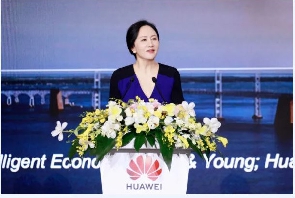 Huawei's Rotating Conference Chairwoman, Meng Wanzhou
Huawei's Rotating Conference Chairwoman, Meng Wanzhou
With global digital transformation spending expected to reach US$3.4trillion by 2026, Huawei’s Rotating Conference Chairwoman, Meng Wanzhou, has advocated a move from narrow artificial intelligence (AI) to general and super-AI.
She said digitalisation is the new blue ocean for the whole information, communication and technology (ICT) value chain, and it is imperative that the strategic objectives of industry should drive digital transformation rather than the technology itself.
“Digitalisation is a new blue ocean for the whole ICT value chain. Enterprises that are going digital and enterprises that are helping others go digital will have huge addressable markets and huge economic benefits,” Ms. Meng said during Huawei’s 20th Global Analyst Conference held in China.
Against this backdrop, the leading global provider of ICT infrastructure and smart devices said it will ramp up its investments in domains like connectivity, computing, storage and cloud – in a bid to deepen its drive to enable productivity and efficiency improvements across industries such as mining, healthcare, ports, transportation and many others.
Huawei has over the years built in-depth partnerships with nearly 200 power enterprises worldwide, and is providing digital services for more than 20 leading oil and gas enterprises and 800 mining enterprises.
In Ghana, government’s strategic digitalisation agenda, if pursued to the letter, could position the country as a fertile ground for data science research and development; and to take advantage of this investment to develop AI solutions for the agriculture, health, education and financial sectors.
It will also provide unique opportunities to accelerate economic growth and connect citizens to services and jobs, a move that could support efforts to restore macroeconomic stability.
Digital infrastructure
Huawei disclosed it is building the digital infrastructure that will support these increasingly diverse and complex industrial scenarios. These networks require ultra-reliable and fast connections between people and intelligent objects, and between home and factories. It is leading the development of next-generation 5.5G infrastructure, developing the technology and networks that will support over 100 billion connections and deliver a 10-gigabit user experience.
Outlining the four distinct characteristics of digital infrastructure that Huawei is delivering to help customers go digital, Ms. Meng said: “We aim to provide our customers with digital infrastructure that has the simplest possible architecture and the highest possible quality, delivering the best possible experience at the lowest possible costs.
“Our goal is to help organisations go digital in four stages: digitising operations, building digital platforms, enabling platform-based intelligence, and putting intelligence to use. The time is ripe to thrive together in this new and exciting digital future.”
An intelligent world needs new networks and new computing
As humans move toward an intelligent world, two key areas were identified during the conference: new networks and new computing. As a result, Dr. Zhou Hong – President of the Institute of Strategic Research – observed that networks and computing are the two key cornerstones underpinning the shift from narrow AI toward general-purpose AI and super-AI.
“To get there, we will need to take three key steps. First, we need to continue driving breakthroughs in theories and technologies to deliver ubiquitous, intelligent connectivity and drive social progress. Second, we need to keep pushing our cognitive limits to better understand and control intelligence. Finally, we need to define the right vision and use the right approach to guide AI development in a way that truly helps overcome human limitations, improves lives, creates matter, controls energy, and transcends time and space. This is how our society as a whole will continue to evolve and thrive,” he said.
The goals of AI must be defined and aligned
He added that as AI’s capabilities are improving rapidly, there’s a need to consider how to make sure the development of AI is what people want and ensure AI execution is accurate and efficient.
“We must create rules and laws to enhance AI ethics and governance.” He believes that from a theoretical and technical perspective these goals present three major challenges: AI goal-definition, accuracy and adaptability, and efficiency.
“If we don’t have an agreed-upon definition, it’s almost impossible to ensure that the goals of AI and human beings will be aligned. It also makes it difficult to make reasonable classifications and computations,” Dr. Zhou explained.
Meanwhile, a panel discussion was held during the summit on the role that digital productivity plays in driving industrial digitalisation, the challenges industries face in their digitalisation process, recommended actions, as well as expectations for industries in the process of building up their digital productivity.
The panellists included Li Peng, Chief Expert of China Southern Power Grid Corporation and Managing Director of its Digital Power Grid Group; Liang Yongji, Executive Director of Engineering and Technology at the Airport Authority Hong Kong; Liu Hong, Head of Technology at GSMA in Greater China; and Charles Ross, Principal of Technology and Society at Economist Impact.
Watch the latest edition of BizTech and Biz Headlines below: